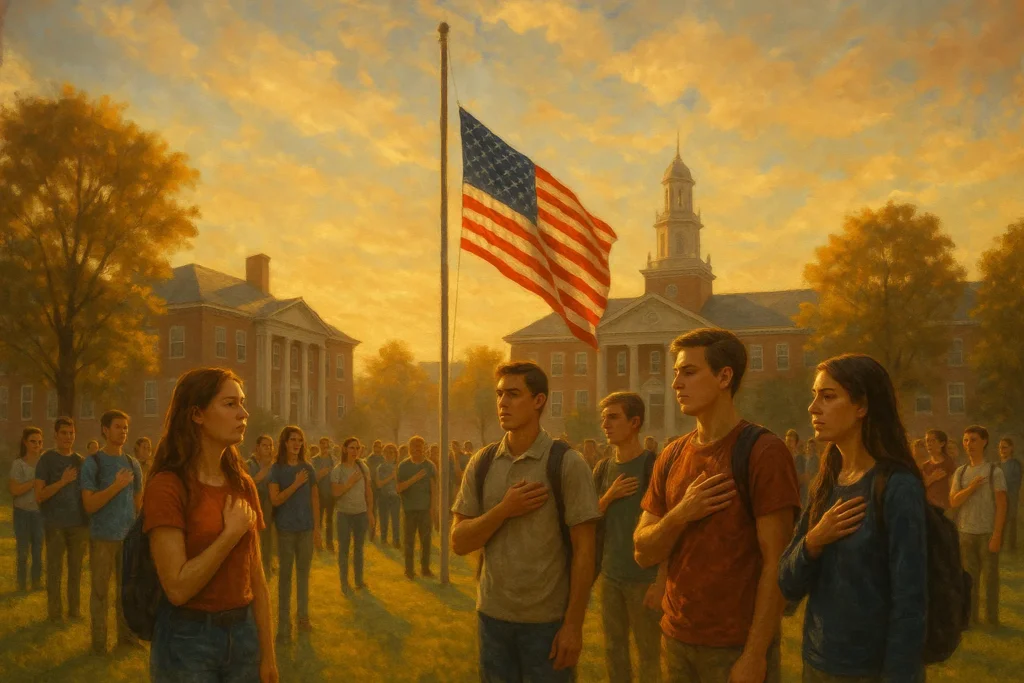The shot that killed Charlie Kirk did more than silence a voice—it ripped open the fault line that defines our age. On one side stand the young warriors of the culture war, fighting not for clout or credentials but for the soul of a collapsing nation. On the other slouch the tuxedoed courtiers of the Republican establishment, drifting from donor dinner to wine-tasting retreat, men and women who long ago traded victory for vanity, courage for comfort, sovereignty for access to the next cocktail party.
Dying in the Arena
Kirk, assassinated at a university speaking event, died as he lived: in the arena. He wasn’t a commentator shuffling paper in a studio. He wasn’t a consultant penning bloodless memos about “electability” and “broadening the tent.” He was on the front line—where the real war is fought—face-to-face with a generation taught to hate its ancestors, despise its instincts, and scorn its own nation.

The university quad is not neutral ground. It is the forge where tomorrow’s ruling class is manufactured, where ideologues hammer dissenters into silence. Kirk knew that if conservatives surrendered that ground, they would lose the country.
Building What the GOP Wouldn’t
At eighteen, he founded Turning Point USA. Think about that. While his peers worried about prom dates and finals, Kirk saw a void—a deliberate, engineered absence—where conservative thought had been banished. The GOP’s idea of “outreach” was a half-dead “Young Republicans” club meeting twice a semester to recycle talking points about marginal tax rates. Kirk refused to wait for permission slips from the RNC. He built a counter-culture with his own hands. He gave students something the consultants never could: pride, belonging, and intellectual weapons to fire back. He grasped what the party still denies—politics is downstream from culture, and a nation whose youth despise it cannot survive.
The Political Vampires
And while Kirk’s army of students endured harassment, doxxing, deplatforming—and now assassination—what was the establishment doing? Hosting $5,000-a-plate fundraisers. Whispering to their diaspora donors that the troublesome patriot’s growing skepticism of a foreign flag would be ‘managed.’ Their courage extended no further than a tweet condemning anti-Semitism while ignoring the anti-Americanism of a client state that drains our treasury and dictates our policy. Their idea of warfare was a super PAC ad buy.
They are not leaders. They are political vampires. They drain the energy, sacrifice, and blood of the grassroots they secretly loathe. They mock the people who put them in power as “deplorables,” “crazies,” and “the great unwashed problem we have to manage.” They let Kirk’s generation take the bullets—literally, from a leftist radicalized in the very university systems they lack the will to defund. Then, once the ground is safe and the idea sanitized, they swoop in to steal credit, polish the rhetoric, and cash the checks.
A Death That Indicts the Party
Kirk’s death is their indictment. He died defending a nation they abandoned for the favor of foreign interests. They will issue a statement, lower their logos to half-mast, perhaps even name a meaningless award after him. By lunch, they’ll be back on the phone with lobbyists, fretting that his “tone” might alienate suburban moderates. The truth is simple: they did not deserve him, his movement, or the blood he shed.
A Revolutionary Pattern
History is full of these collisions. Scottish patriot William Wallace defying the King Edward the tyrant. The American colonists against the powdered wigs of empire. Reagan against the Rockefeller patricians. Trump against the Bush dynasty. Every revolution begins when an outsider exposes the hollowness of the insiders. Charlie Kirk was that figure for his generation. He was not their product; he was their judge. He revealed the Republican Party as a club of comfortably irrelevant courtiers, incapable of defending even the ground beneath their feet.

Conclusion: The Torch He Left Behind
Kirk built what they lacked: courage, vision, and a will to win. He proved that some things are worth fighting—and dying—for. The establishment proved only that nothing is worth ruffling a tie for.
His legacy is not a strategy memo. It is a reproach. It is a torch. If the party refuses to carry it, then the people must. For Kirk’s blood consecrated a truth that cannot be ignored: the future does not belong to the donors, the consultants, or the cowards. It belongs to those willing to fight in the arena—and to those willing, if necessary, to die there.
—Wolfshead




